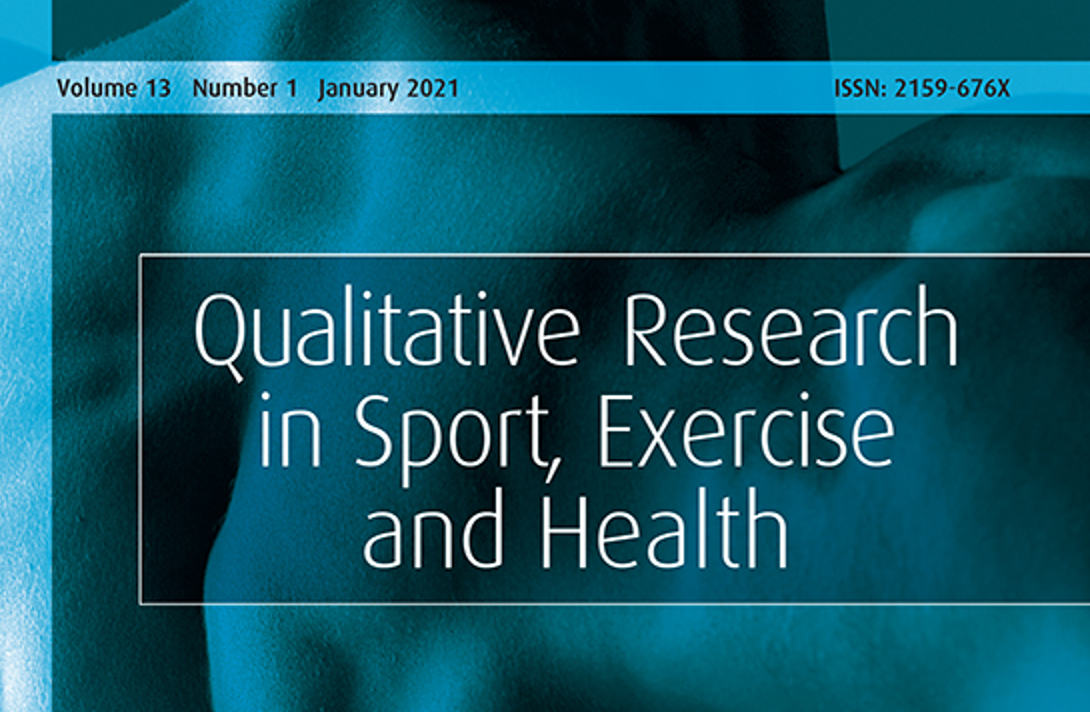 A special issue of the Qualitative Research in Sport, Exercise & Health (QRSEH) journal (Volume 13, Issue 1, 2021) has been published on the fascinating and timely topic of ‘Contemporary digital qualitative research in sport, exercise and health.’ The special issue was edited by Dr. Andrea Bundon, an assistant professor in the UBC School of Kinesiology and by Dr. Victoria Goodyear, a senior lecturer in Pedagogy in Sport, Physical Activity and Health who specializes in digital technologies and social media in young people’s health and wellbeing at University of Birmingham.
A special issue of the Qualitative Research in Sport, Exercise & Health (QRSEH) journal (Volume 13, Issue 1, 2021) has been published on the fascinating and timely topic of ‘Contemporary digital qualitative research in sport, exercise and health.’ The special issue was edited by Dr. Andrea Bundon, an assistant professor in the UBC School of Kinesiology and by Dr. Victoria Goodyear, a senior lecturer in Pedagogy in Sport, Physical Activity and Health who specializes in digital technologies and social media in young people’s health and wellbeing at University of Birmingham.
QRSEH is one of the leading international academic journals for researchers from various disciplines (including such areas as sociology, psychology, history, pedagogy, and philosophy) that use qualitative methods. As Andrea explains, “a special issue is essentially the academic equivalent of an Instagram takeover!” The editors of an existing journal hand over the reins to a guest editor (or co-editors in this case) who then issue a call to researchers to submit papers on a particular issue. Special Issues are often done around a particularly ’timely’ or ‘emerging’ topic. In this case, Bundon and Goodyear had started to work on an issue on digital technologies and sport, exercise and health two-and-a-half years ago — long before the pandemic. But the pandemic only amplified what they were speaking about. “How many people went out and bought a Peleton bike or starting taking online yoga classes?” asks Bundon.
Why now? Why this topic?
When Bundon started her PhD in 2008 she studied the use of blogs by Paralympic athletes. She reveals, “I was one of a handful of scholars worldwide at that time who were interested in how internet culture and sport culture were coming together. It was still pretty niche to say you were using ‘digital qualitative methods’ (ie. researching digital content, using digital tools or platforms to engage participants). Now most qualitative researchers engage with digital tools or digital culture in some way – even if it’s just doing your interviews via Zoom. It’s rare that I review any work these days that doesn’t have a least some engagement with digital methods or digital data. This has been referred to as the ‘post digital age’ – a time where technology is so embedded in our lives that it is more notable in its absence than in its presence. We wanted to capture this moment – discuss how far it’s come, what’s coming next and showcase the work of scholars doing truly innovative, ethical, rich research.” There has also been a real explosion in digital networks of athletes and exercisers (ie. runners and cyclists on Strava), a change in how sports organizations and individual athletes engage with fans on social media (Twitter, Instagram), and a huge increase in digital fitness prosumption (a term used to reference how we both produce and consume fitness related data in using wearable devices such as Fitbits). For scholars interested in this field, the options and opportunities are endless.
Carefully curated, articles in this special issue include:
- #gainingweightiscool: the use of transformation photos on Instagram among female weightlifters in recovery from eating disorders.
- Blurring boundaries between humans and technology: postdigital, postphenomenology and actor-network theory in qualitative research.
- From fat and frazzled to fit and happy’: governing the unhealthy employee through quantification and wearable technologies.
Two of the articles published are by researchers from the UBC School of Kinesiology including:
- More than meets the eye: a relational analysis of young women’s body capital and embodied understandings of health and fitness on Instagram (by MA student Meaghan Toll and Dr. Moss Norman).
- Reflections from the Strava-sphere: Kudos, community, and (self-)surveillance on a social network for athletes (by PhD Candidate Jesse Couture).
There is FREE ACCESS to this special issue of QRSEH to the end of January, 2021, and which may be extended into February.
To read the issue click here: https://www.tandfonline.com/doi/full/10.1080/2159676X.2020.1854836